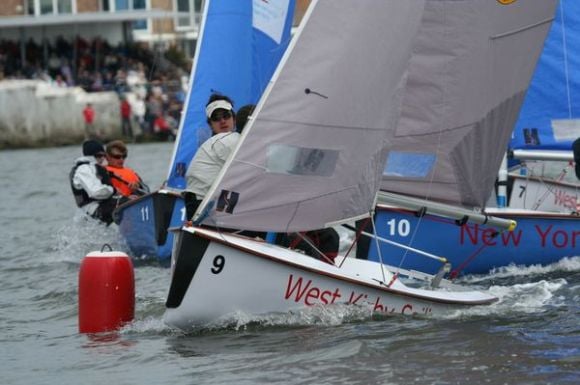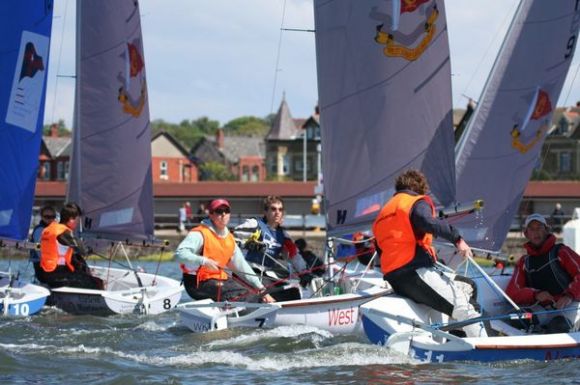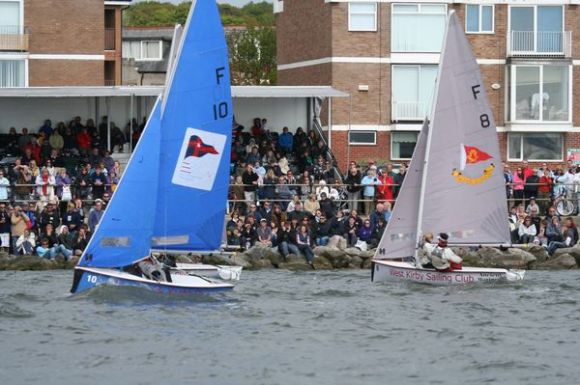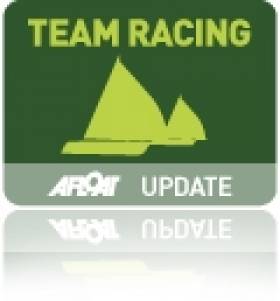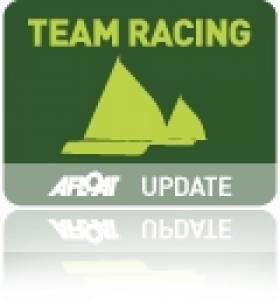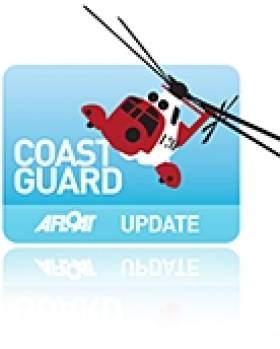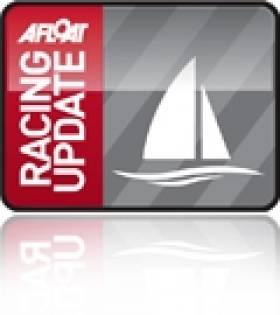Displaying items by tag: West Kirby
#WilsonTrophy – Team racing's annual pinnacle, the Wilson Trophy, came to a close this afternoon with a worthy victor in West Kirby Hawks. Two Irish teams competed in the 22 rounds event.
The third and last day of racing on the Wirral seaside town's Marine Lake, overlooking the River Dee and with Wales as a backdrop, was roundly won by the local favourites, who beat Wessex Exempt 3-1 in the Final.
Kinsale Yacht Club and Howth Yacht Club finished 21st and 22nd from the 28 competing teams. Download results below.
For the last day of the Wilson Trophy, the wind had swung into the south, blowing out of the River Dee estuary, starting in 15 knots gusting to 18, then veering and dropping to below 10, for the final rounds. The Swiss League qualifiers ended after 22 rounds, before moving into best of three Quarter Finals and Semis and best of five Finals. These truly showcased team racing at its very highest level, with spectators lining the shallow banks of the Marine Lake providing a soundtrack of gasps, whoops, hollas and outcrys as the titans of the sport slogged it out.
West Kirby Hawks hasn't won the Wilson Trophy since 2012, but the team is the reigning World Champion, following their victory in Schull, Ireland in 2011. In fact this year is the first time since Schull, that the World Championship winning line-up of Andrew Cornah, Ben Field, Dom Johnson, Hamish Walker, Tom Foster, Debs Steele have regrouped. The reason for 'getting the band back together' is the team's desire to defend its title this year at the ISAF Team Racing World Championship due to be held on Rutland Water in July.
"The Wilson is the pinnacle of team racing, because there are so many fantastic teams here pitting it out," explains West Kirby Hawks leader Dom Johnson, who flew in from Singapore especially for the event. Here he was reunited with his crew, Debs Steele, one of the most capped Wilson Trophy competitors of all time, having sailed it 23 times and been in the final 12 times. "If you look at any of the top eight teams, any one of them can perform and take races off the other."
Saying that, West Kirby Hawks finished the Swiss League qualifiers having only been beaten in three after 22 races. In fact throughout this Wilson Trophy they only suffered four defeats. However, as Johnson pointed out, their races "weren't walkovers. They were gritty races where we were having to do conversions and come-backs. There weren't too many 1-2-3 sail-aways. The conditions were part of that, because it was quite changeable, but that was great for us in terms of progression and practice."
The Finals also saw a number of incidents, including a major one which Johnson (fourth from the right above) admitted he may have caused, as he explained: "Mark 3 at the bottom of the run can often be a 'point of congestion' in team racing. In one race we felt in control with a 2-3-4, which is a winning combination, and there was a slight boat handling error on my part: I was trying to gybe across, spun out slightly in a puff and crashed into my team mate and also the opposition boat that was trying to do a mark trap. So I caused a bit of mayhem." That was in the only race of the Final in which the Hawks suffered a defeat.
Some eminent sailors failed to make the grade. One of the most promising teams, from the Royal Dee Yacht Club, led by Team GBR Nacra 17 sailor Ben Saxton, ended up being knocked out in the Semi-Finals, a repeat of their performance here last year. Sailing with Saxton was 'super crew' Toby Lewis. "One of the reasons we have done okay is that we are all fast sailors and boat speed is important because it makes your tactics a lot easier if you are quick," observed Lewis for whom this was his seven Wilson Trophy. "They are all very good sailors here - it is a challenge."
London 2012 Olympic 470 silver medallist Stuart Bithell was racing as part of the Weymouth and Portland National Sailing Academy team: "It has been a brilliant Wilson Trophy for us - I think we've had the most wins we've ever had, even though we didn't make the Quarters. In fact we were quite up and down – we'd have a really good run and then we'd start racing better teams and it became trickier..." While this is only his third time at the Wilson Trophy with the WPNSA team, Bithell originally raced the Wilson a nipper, when he represented his original club, Hollingworth Lake, near Rochdale.
In summary, West Kirby Sailing Club Commodore Phil Shepherd commented: "It has been a fantastic weekend - everything went well. The boats held together very nicely and the number of races, the speed of turn-arounds speaks for itself. The quality of the competitors was also amazing. This is certainly the most competitive Wilson Trophy I have ever witnessed."
And in case you are wondering, the total number of races run by PRO Adam Whittle and his team at this year's Wilson Trophy was...324.
Top five:
West Kirby Hawks
Wessex Exempt
Royal Dee YC
Yale Corinthian YC
Bristol University
Ireland to Join World's Top Team Racers for UK Battle
In less than a month's time, Dun Laoghaire's Royal St. George Yacht Club will join the world's best team racers in the United Kingdom for the sixty-second edition of the Wilson Trophy British Open Team Racing Championship, hosted and organised by West Kirby Sailing Club.
This year's Wilson Trophy, which will take place on the Marine Lake in West Kirby from the 6 - 8 May, has, as expected, attracted another high quality entry list, with the 32 selected teams coming not only from the length and breadth of the United Kingdom, but from Ireland and the United States as well.Sailing in identically matched, colour coded Firefly dinghies, used exclusively for this event, the 32 teams will fight it out over three days of Swiss league and elimination rounds, culminating in a thrilling Grand Final to be sailed in front of a packed spectator grandstand on the final afternoon.
The Wilson Trophy is a major logistical undertaking. Over the 3 days, more than 300 races are started, finished, accurately scored and uploaded to the online rolling results service. On the water, a twenty-five strong team of international umpires are on hand to give instant decisions on rule infringements and dish out the appropriate penalties. And to keep the throngs of spectators on shore happy and well informed, an expert commentary team broadcasts live updates on all the action out on the lake.
With many of the teams yet to confirm their final sailor line-up, an assessment of potential form is difficult at this stage. Suffice it to say however that the great and the good of the team racing world will be in West Kirby for this year's Wilson Trophy.
2010 winners, Team Extreme from the USA are back to defend their title and will be looking to reproduce the calm and composure with which they swept undefeated through the qualification rounds last year, before inflicting an uncharacteristic and uncomfortable 3 - 0 whitewash defeat on local heroes the West Kirby Hawks, in the Grand Final. For their part, the West Kirby Hawks will no doubt be out for revenge and keen to expunge the memories of that 2010 final. If recent form is anything to go by, the the Hawks look to have hit their peak at just the right time. By all accounts they were on ruthless form at the recent UK RYA National Team Racing Championship; blazing through the elimination rounds undefeated before summarily dismissing locals Spinnaker Auspicious in the final, to retain their UK National Team Racing Champions title.
However with top quality teams like the Woonsocket Rockets (USA), the Royal St George Yacht Club (IRL) and the New York Yacht Club (USA) and several others with their eyes fixed on a Wilson Trophy victory, Team Extreme and the West Kirby Hawks will have their work cut out if they are to set up a return Grand Final showdown.
RNLI Hovercraft in Rescue of Girl
At 5.30 pm last night Liverpool Coastguard were alerted to a local 15 year old girl in difficulty by the Leasowe Lighthouse on Moreton Common, Wirral, on Merseyside on the far side of the Irish Sea . She was completely cut off by the tide about 100 metres out on the nearby sandbank.
The Hoylake Coastguard Rescue Team were alerted as was the RNLI New Brighton hovercraft and West Kirby inshore lifeboat.
In the meantime the local Coastguard Sector Manager Steve Travis along with his team deployed their mud sled and recovered the girl to dry land.
By 6.30 pm this evening the girl was safely back at home with her mum.
Paul Kirby, Duty Watch Manager at Liverpool Coastguard said
"Our thanks are due to Steve and his team and the RNLI crews from Hoylake and West Kirby for responding so promptly to our call.
As the evenings are now darker after the clocks went back, swift tides and sandbanks can present a major problem for the unwary in the darkness. Please take care when going anywhere near tidal waters and make sure you know the times of the tides."
Dublin Windsurfer Claims Irish Speed Sailing Record
"I know for sure my Max Speed of 47.17 knots is the fastest any Irish sailor has ever done" he claims.
The current record, approved by the World Speed Sailing Council, was set by John Kenny in February who achieved a personal best of a burst of 45.3 knots (it's 84 kph) and averaged 42.52 for the 500 metres.
Van Gelderen describes the build up to yesterday's record attempt at the UK's West Kirby venue:
"The wind was pretty strong - 30-40 knots, so I rigged my brand new Pryde 4.7m RSRacing - just to get the hang things. As it turned out, this sail was perfect for me all day (I'm not the heaviest speed-sailor at 78 kgs).
I knew my board was already fast, but I'm also delighted with the sail, which was rigged for the first time and performed straight away without any tuning.
Van Gelderen's record breaking tracks are HERE
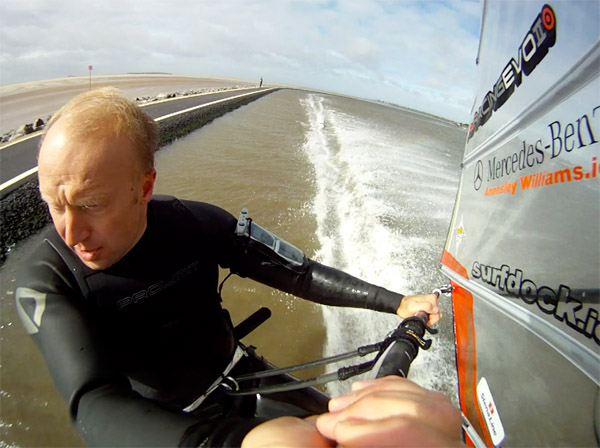
Oisin Van Gelderen concentrates on a speed sailing record run in West Kirby yesterday, its famous wall in the background
Two RSGYC teams in Wilson last eight
Two teams from the Royal St., George YC in Dun Laoghaire made it to the last eight of the 339-race Wilson trophy after 20 rounds of competition at West Kirby Sailing Club this weekend. It is the 16th appearance for the club at the UK event. Both the George Knights, (John Sheehy/Noeline Morgan, Nick Smyth/Rach Macmanus and Ger Owens/Melanie Morris) and another Royal St George team (Marty O'Leary/Brian Fenlon, Sam/Rachel O'Brien and Jonny O'Dowd/Rachel Guy) reached the quarter-final stage and pushed their quarters to the third race of the best-of-three, but failed to progress.
The final day of the 2010 Wilson Trophy dawned beautifully bright and clear and following a brief delay to allow the wind to build strength and stabilise direction, racing for the final part of the round robin element got underway. At this stage in the competition, every point counted for those teams hoping to make into the final eight and with a gaggle of teams mathematically capable of progressing to the next round, many of the matches understandably developed into full pitched battles.
American visitors Team Extreme continued where they had left off from the previous two days and immediately began adding to their string of winning performances to further extended their advantage at the top of the leaderboard. By midday the both local West Kirby Hawks and the American Woonsocket Rockets had also guaranteed their places in the quarterfinals. Despite showing much promise in the previous two days, the team from Royal Thames suffered a disastrous sequence of defeats in the early morning races, which plummeted them down the pecking order and effectively snuffed out their chances of qualifying for the knockout rounds. Meanwhile both Bath and the local Hibre Highlanders team were staging last-ditch bids to make the final eight with stellar performances in their races. When these two teams eventually met, it was the Hilbre Highlanders who managed the last beat to perfection to cross the line in a convincing 1,2,4 configuration and keep their hopes of a quarter-final berth alive.
The final round of races threw up a series of do or die confrontations. In the match between the Royal St George and New York Red the American team saw off a frenzied attack by the Irish on the final beat to take the win with a 2,3,4 pattern at the finish. Wessex Exempt needed to win their race against Hilbre Highlanders to qualify for the knockout stage. With almost nothing between the two teams for the first two legs, the final run developed into a six-way dogfight, which also continued down the penultimate leg, and if anything the action intensified even further on the final beat. With advantage flick-flacking between the two teams as the boats approached the line, the Highlanders looked to have done enough, but a penalty against them in the last few seconds saw Wessex Exempt snatch the win and squeak their way through to the final rounds. The New York Red versus West Kirby Sailing Club match was an important affair for both teams. After a truly classic battle, the local team grabbed the advantage on the final mark rounding to take a winning 2,3,4 combination which they held comfortably to the finish.
The quarterfinals turned out to be a real showcase for top-flight team racing, with all the matches requiring three races to separate the teams. Wessex Exempt took the round robin winners Team Extreme to the wire but finally succumbed to a commanding performance from the Americans in the final race. The match between the reigning champions West Kirby Hawks and the Royal St George was a real nail biter and only decided in the final boat lengths to the finish of the third race. West Kirby Hawks made a remarkable comeback on the final beat to eke out a 2,3,5 victory in a photo finish on the line. A last beat penalty against the St George Knights whilst approaching the finish of their third race against New York Red put paid to the Knights challenge and left the New York Red team to join their countrymen in the semi final. After losing their first race against the Woonsocket Rockets the West Kirby Sailing Club team looked to be facing elimination when they trailed the American team at the final mark of their second race. However a masterful piece of team racing at on the final beat saw them claw their way back to a winning 1,3,5 overturn at the finish.
The semi-final pairings threw up both all American and all West Kirby matches. Team Extreme won the first race of the American semi-final and took early control of the second race with a great team start. Their advantage was increased when a penalty was awarded against the race leading New York Red boat for an illegal mark trap attempt at the first buoy. New York Red never really recovered from this and Team Extreme were able to close out the match two wins to nil.
West Kirby Hawks also won their tense local derby match against West Kirby Sailing Club two races to zero. West Kirby Sailing Club didn’t go down without a fight however and turned the second race into the team racing equivalent of a western bar room brawl. With all six boats locked in a melee of team racing manoeuvres for the entire race, advantage swung backwards and forwards on each leg, but the West Kirby Hawks eventually prevailed on the final beat to take their second win of the semi-final and secure their place in the Grand Final.
Team Extreme looked to have handed the first race to the West Kirby Hawks when two of their boats were caught OCS on the start. However by the first mark the Americans were right back in it and pushing for a winning combination on the first reach. A double mark trap by the West Kirby Hawks appeared to have put the local team back in control but in the scrap on the penultimate leg the Hawks were awarded two penalties which gave Team Extreme a 1,2,3 winning score at the finish.
Race two of the Grand Final got off to an even start with Team Extreme eking out a narrow 2,3,4 advantage by the top mark. The visitors held both their nerve and their winning positions on the following three legs and despite some slick race-slowing attempts by the leading West Kirby Hawks boat, the Americans were still in control at the start of the final beat. Team Extreme very effectively locked down the race on the last leg, narrowing the local team’s options and eventually taking their second win to go two nil up in the Grand Final.
Race three got away with a closely fought start which saw a single West Kirby Hawks boat called OCS. The action remained too close to call for the entire first beat but when Team Extreme were awarded a penalty on the approach to the top mark, the West Kirby Hawks were able to get around in a useful 2,3,5 combination. However, a West Kirby Hawks penalty at the end of the first reach quickly threw the advantage back to Team Extreme. The Americans immediately capitalised on this with a neat mark trap at the bottom of the run, catapulting them into a powerful 1,2,5 combination. The West Kirby Hawks woes were then further compounded by yet another penalty at the final mark and this left them powerless to prevent Team Extreme easing into a game, set and match winning 1,2,3 formation at the finish.
So Team Extreme from the USA, - Zach Brown & Emmet Smith, Adam & Melanie Roberts and Stuart McNay & Abby Coplin - who had dominated the qualification rounds so comprehensively, had gone on to pull off an equally dominant whitewash victory in the Grand Final and become deserved winners of the 2010 Wilson Trophy British Open Team Racing Championship.
Full results at the end of day one can be found at the official website: http://www.wksc.net/
Photos by Phil Shepherd
